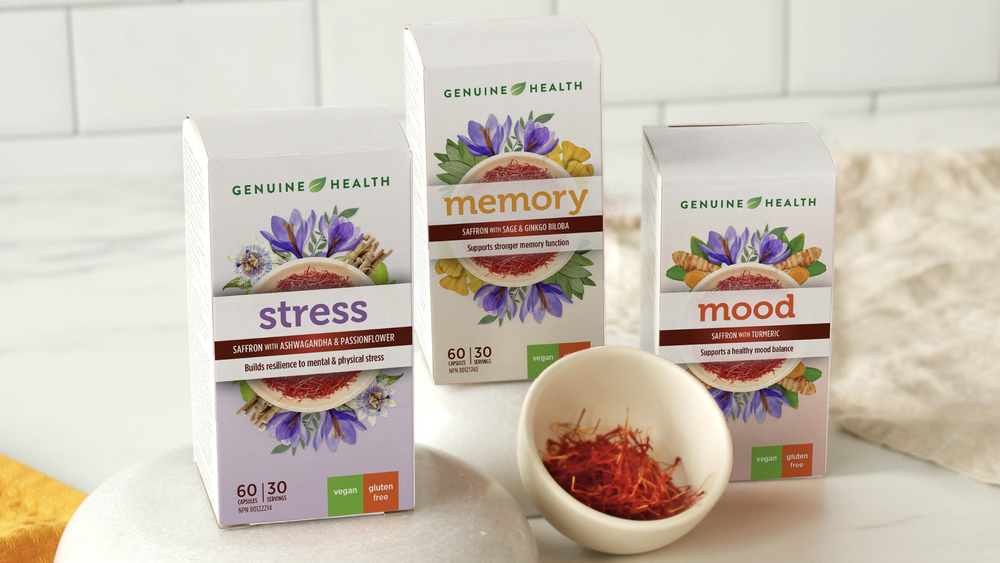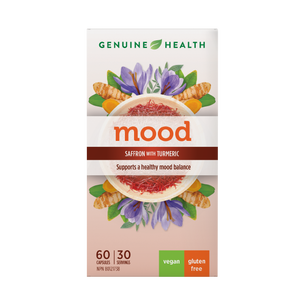Saffron - Why we made it?

Now more than ever, mental outlook is top of mind. Maintaining a positive mental outlook means we have a strong ability to navigate life’s ups and downs with resilience, so we can lead productive, happy, and fulfilling lives. Unfortunately, not enough of us are flourishing. We all know people that are struggling, whether it is you, your friends, your family. By the time Canadians reach the age of 40, 1 in 2 have – or have had – a mental illness.¹
At Genuine Health, we recognize the growing number of people that face challenges with their mental outlook daily, with a growing need for a natural and effective solution to help people cope with the demands of today’s fast-paced and stressful world. That’s why we’ve dedicated ourselves to doing the research and finding natural and unique ingredients to help optimize your brain health.
Saffron, also known as the “sunshine spice”, has been used for hundreds of years in traditional medicine- all the emerging research caught our attention! Saffron is harvested by hand from the crocus sativus flower. The term “saffron” applies to the flower-like thread structure called stigma located inside the petals. It’s the most expensive spice in the world, often referred to as “red gold.” 8
We learned saffron has many benefits, from cardiovascular protection to inflammation. But for us, the interesting research was around depression, stress, and memory- it caught our attention. Small clinical studies have investigated how saffron compares to SSRI drugs (anti-depressants).⁴’⁵’⁶ Preliminary research indicates that saffron supports mood and its antioxidant properties may potentially improve cognition in adults with Alzheimer’s disease.²’³ Saffron is truly at the intersection of traditional healing and modern medicine.
So how does saffron work? The chemicals in our brain are constantly self-regulating to maintain balance (known as homeostasis), but external factors can play a part in disrupting that.7 For example, sadness can be registered as an external stressor to your body, therefore disrupting the equilibrium. Our body will work to try and fix this imbalance, but sometimes we need some additional support. Premium natural ingredients such as saffron have been shown in research to support this re-balancing effect.
Saffron has been researched on balancing neurotransmitters such as dopamine, and serotonin (our feel-good hormones) by inhibiting the reuptake of these neurotransmitters so that they stay circulating in the brain where they can exert beneficial effects.10 Further research indicates that saffron may facilitate neuroplasticity (the ability of the brain to form and reorganize neural connections).9 Saffron is also a source of antioxidants, protecting against oxidative stress, and may decrease cell death in the brain to maintain levels within the normal range.10
Meet our new line of saffron products! By working in combination with other research-proven ingredients found in nature, each of these products has been designed to support the key components of your brain health. Feel the difference and take on life with a good mood, better memory and less stress.
Let’s talk about stress
stress is here to keep you calm, relaxed and rested, even on your most stressful days, uniquely formulated to help you manage and reduce common symptoms of stress such as fatigue, weariness and irritability. Our formula contains Saffron extract (affron®), which has been research-proven to regulate and improve your body’s natural stress response. Each dose also includes adaptogenic (stress-supporting) ashwagandha (KSM-66 Ashwagandha®) and passionflower extract to help promote feelings of relaxation, while encouraging restorative sleep. With consistent use, every capsule will help you cope with life’s challenges with more ease and build long-term resilience to both mental and physical stress.
What’s your current mood?
mood offers an effective and natural way to keep you feeling uplifted. Saffron (affron®) has research-proven mood-balancing effects and numerous studies have explored the possible beneficial effects saffron has on neurotransmitters like dopamine and serotonin, both of which contribute to a balanced mood.10 We've also included turmeric, a powerful antioxidant used in herbal medicine as an anti-inflammatory, that works to fight oxidative stress.11 Our unique and research-proven combination works together to provide results you can feel, so your good moods can lead to even better days.
How is your memory?
memory has been designed to support your brain health, sharpen your thinking, and strengthen your ability to remember. Many factors can lead to brain fog and forgetfulness, including aging, high stress levels and fatigue. We’ve included a powerful combination of saffron, sage and ginkgo biloba, that actively work to support your short and long-term memory function. Learn new things and problem-solve with more ease, while feeling more productive and prepared to take on your busy days.
References:
- The Crisis is Real. CAMH. Accessed September 19, 2024. https://www.camh.ca/en/driving-change/the-crisis-is-real
- Lu C, Ke L, Li J, et al. Saffron (Crocus sativus L.) and health outcomes: a meta-research review of meta-analyses and an evidence mapping study. Phytomedicine. 2021;91:153699. doi:10.1016/j.phymed.2021.153699
- Adalier N, Parker H. Vitamin E, Turmeric and Saffron in Treatment of Alzheimer’s Disease. Antioxidants (Basel). 2016;5(4):40. doi:10.3390/antiox5040040
- Akhondzadeh S, Fallah-Pour H, Afkham K, Jamshidi AH, Khalighi-Cigaroudi F. Comparison of Crocus sativus L. and imipramine in the treatment of mild to moderate depression: A pilot double-blind randomized trial [ISRCTN45683816]. BMC Complement Altern Med. 2004;4:12. doi:10.1186/1472-6882-4-12
- Akhondzadeh S, Tahmacebi-Pour N, Noorbala AA, et al. Crocus sativus L. in the treatment of mild to moderate depression: a double-blind, randomized and placebo-controlled trial. Phytother Res. 2005;19(2):148-151. doi:10.1002/ptr.1647
- Akhondzadeh Basti A, Moshiri E, Noorbala AA, Jamshidi AH, Abbasi SH, Akhondzadeh S. Comparison of petal of Crocus sativus L. and fluoxetine in the treatment of depressed outpatients: a pilot double-blind randomized trial. Prog Neuropsychopharmacol Biol Psychiatry. 2007;31(2):439-442. doi:10.1016/j.pnpbp.2006.11.010
- Homeostasis | Definition, Function, Examples, & Facts | Britannica. September 9, 2024. Accessed September 19, 2024. https://www.britannica.com/science/homeostasis
- Shahi T, Assadpour E, Jafari SM. Main chemical compounds and pharmacological activities of stigmas and tepals of ‘red gold’; saffron. Trends in Food Science & Technology. 2016;58:69-78. doi:10.1016/j.tifs.2016.10.010
- Puderbaugh M, Emmady PD. Neuroplasticity. In: StatPearls. StatPearls Publishing; 2024. Accessed September 19, 2024. http://www.ncbi.nlm.nih.gov/books/NBK557811/
- Khazdair MR, Boskabady MH, Hosseini M, Rezaee R, M. Tsatsakis A. The effects of Crocus sativus (saffron) and its constituents on nervous system: A review. Avicenna J Phytomed. 2015;5(5):376-391.
- Dehzad MJ, Ghalandari H, Nouri M, Askarpour M. Antioxidant and anti-inflammatory effects of curcumin/turmeric supplementation in adults: A GRADE-assessed systematic review and dose–response meta-analysis of randomized controlled trials. Cytokine. 2023;164:156144. doi:10.1016/j.cyto.2023.156144




















































